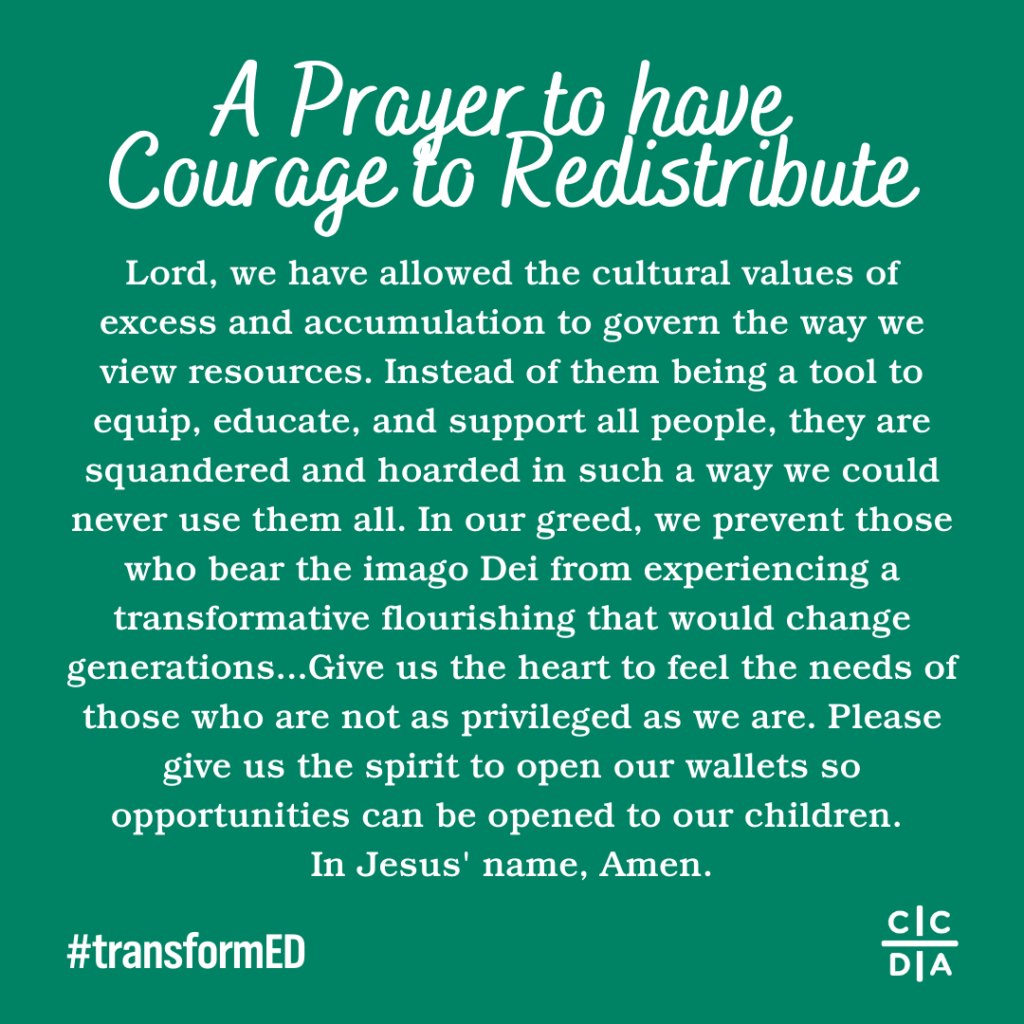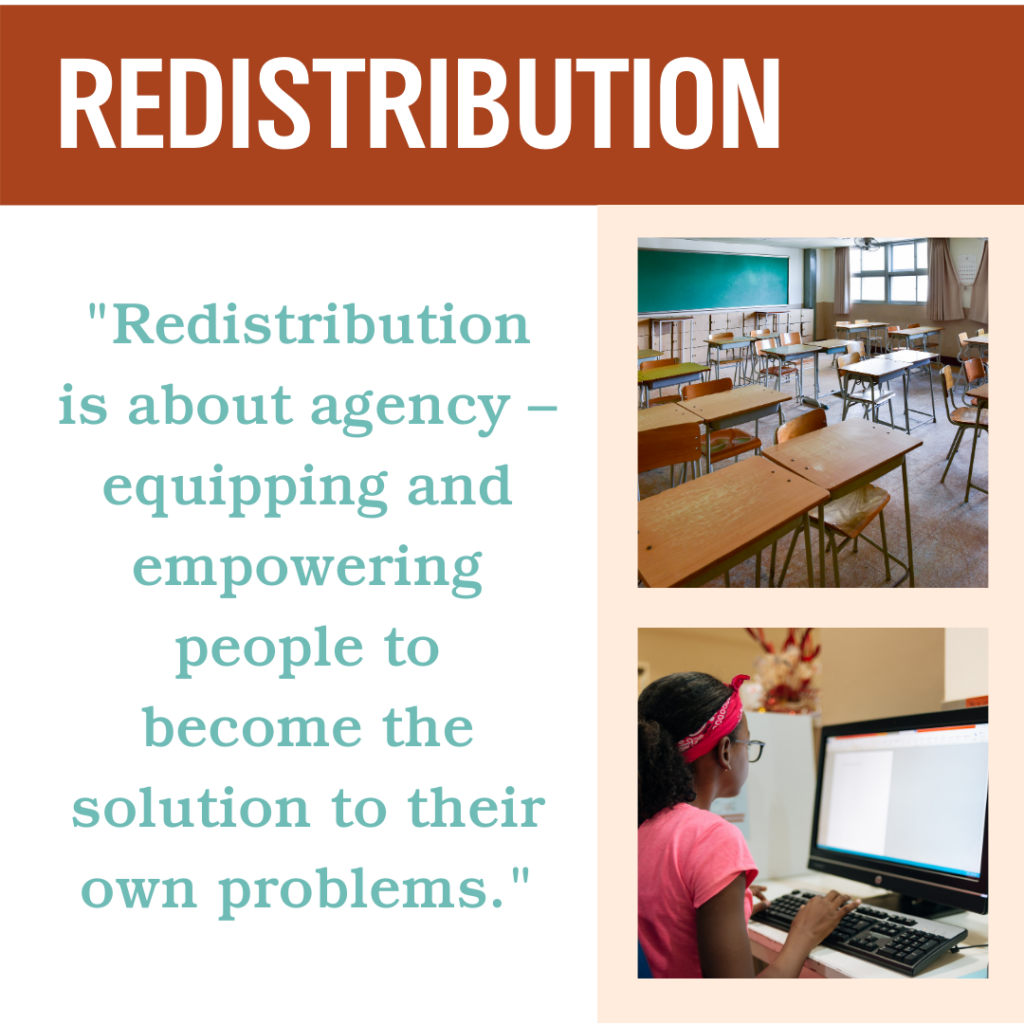Redistribution is one of the Eight Key Components of the CCD Philosophy. But what is Redistribution? And where do we begin?
The following is from The Education Equity Church Partnership Guide, which was created by CCDA’s #transformED Education Equity advocates. This helpful guide used our association’s eight components of Christian Community Development ministry to structure our learning, applying each component through the lens of education equity.
Continue reading for insights into Redistribution and practical ways that you can continue to partner with God and others for community flourishing.
Redistribution in Schools
By Jamie Jessup
Most of us will not hear the call to relinquish all we have for the sake of the gospel. However, all of us will receive the invitation to give something of our possessions for the betterment of others. We should willingly do so, knowing that our giving is not reflective of a loss of our freedom, but rather, the freedom of another to pursue what God has purposed for them to do.
Often schools are limited to receive funding based on the property tax value of homes within their zip codes. Many well-resourced schools have separate non-profits to meet state and local funding gaps. Consequently, the students and families already blessed with an abundance of resources receive more while those who have little, keep little. Despite this fact, our under-supported families find a way to achieve. How much more would they do if they had more to utilize?
CCDA practitioners understand the concept of redistribution extends beyond the notion that one group loses material resources while the other groups gain the resources. Having the resources for accumulation’s sake is not the desired result. We understand that when historically under-supported communities obtain support, they are empowered to transform their communities. In the case of schools, when black and brown students have the same support as their white counterparts, they have a more excellent opportunity to experience the educational system’s benefits. Redistribution involves “striving for justice, especially in underserved communities” (Making Neighborhoods Whole).
Redistribution is about agency – equipping and empowering people to become the solution to their own problems.
This is a goal in education. In their book, Making Neighborhoods Whole, CCDA founders Dr. John Perkins and Coach Wayne Gordon asserted that education “is the single most important avenue for creating fair opportunity” (p. 77).
Though it is not the quickest solution, the best solution for community transformation is to raise up a generation of skilled community leaders working toward neighborhood flourishing.
A Prayer to Have Courage to Redistribute
Lord, we have allowed the cultural values of excess and accumulation to govern the way we view resources. Instead of them being a tool to equip, educate, and support all people, they are squandered and hoarded in such a way we could never use them all.
In our greed, we prevent those who bear the imago Dei from experiencing a transformative flourishing that would change generations. Forgive us for not loving our neighbors as we do ourselves. For the crime of denying little ones the opportunity to realize their purpose and potential, please forgive us.
Reorient our hearts to charitable generosity, giving to glorify you, and correct past injustices which left communities of color financially disenfranchised. Give us the heart to feel the needs of those who are not as privileged as we are. Please give us the spirit to open our wallets so opportunities can be opened to our children. In Jesus’ name, Amen.
Next Steps
- Learn about Title 1 schools and see if there are any near your church or in a neighboring district.
- Look at what resources they have and may need. How can these resources be distributed in a way that students and their communities benefit? Share what you learn with others in your church community.
- As you begin to learn about schools with fewer resources, pray that God will give you vision for educational equity and how your congregation can engage more deeply in supporting it.
- Reach out to the school’s leadership to hear what they are proud of and what their pain points are. Resist the temptation to rely upon assumptions or to build immediate fix solutions that don’t center those in the community. To have integrity, it is imperative that schools are engaged in an intentional manner to strengthen ties and increase awareness of felt needs.
- Offer to support where needed, always working to lean into the bigger, longer story of how the community was formed and how working together can help it be more successful.
- Educate your congregation on what you are learning and help them become prepared to identify possible collaborative partners, mobilize for action, and strategically deploy collective resources for the purpose of educational equity.
Want to learn more about how to apply the CCD Philosophy in education?
Check out our Education Equity Church Partnership Guide.






